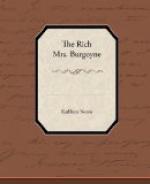Here they came, sure enough, under the flags and garlands, through the noonday heat. Only vague brassy notes and the general craning of necks indicated their approach now; but in another five minutes the uniformed band was actually in view, and the National Guard after it, tremendously popular, and the Native Sons, with another band, and the veterans, thin, silver-headed old men in half a dozen carriages, and more open carriages. One held the Governor and his wife, the former bowing and smiling right and left, and saluted by the rising school children, when he seated himself in the judges’ stand, with the shrill, thrilling notes of the national anthem.
And then another band, and—at last!—the slow-moving, flower-covered carriages and motors, a long, wonderful, brilliant line of them. White-clad children in rose-smothered pony-carts, pretty girls in a setting of scarlet carnations, more pretty girls half-hidden in bobbing and nodding daisies—every one more charming than the last. There were white horses as dazzling as soap and powder could make them; horses whose black flanks glistened as dark as coal, and there was a tandem of cream-colored horses that tossed rosettes of pink Shirley poppies in their ears. The Whites’ motor-car, covered with pink carnations, and filled with good-looking lads flying the colors of the Women’s Club and the nation’s flag, won a special round of applause. Mrs. Burgoyne and Barry loyally clapped for the Pratt motor-car, from which Joanna Burgoyne and Lizzie Pratt’s children were beaming upon the world.
“But what are they halting for, and what are they clapping?” Sidney presently demanded, when a break in the line and a sudden outburst of cheering and applause interrupted the parade. Barry again hung at a dangerous angle from the window. Presently he sat back, his face one broad smile.
“It’s us,” he remarked simply. “Wait until you see us; we’re the cream of the whole show!”
Too excited to speak, Sidney knelt breathless at the sill, her eyes fixed upon the spot where the cause of the excitement must appear. She was perhaps the only one of all the watchers who did not applaud, as the eight powerful oxen came slowly down the sunshiny street, guided by the tall, lean driver who walked beside them, and dragging the great wagon and its freight of rapturous children.
Only an old hay-wagon, after all; only a team of shabby oxen, such as a thousand lumber-camps in California might supply; only a score or more of the ill-nourished, untrained children of the very poor; but what an enchantment of love and hope and summer-time had been flung over them all! The body of the wagon was entirely hidden by exquisite hydrangeas; the wheels were moving disks of the pale pink and blue blossoms; the oxen, their horns gilded, their polished hoofs twinkling as they moved, wore yokes that seemed solidly made of the flowers, and great ropes of blossoms hid the swinging chains. Over each animal a brilliant cover had




